Leadership of East Germany
The political leadership of East Germany was in the hands of several offices.
| Leadership of East Germany | |
|---|---|
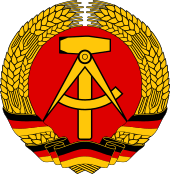 State Coat of arms | |
| Residence | Schönhausen Palace Majakowskiring Waldsiedlung |
| Formation | 7 October 1949 |
| First holder |
|
| Final holder |
|
| Abolished |
|
Prior to the proclamation of an East German state, the Soviets established in 1948 the German Economic Commission (DWK) as a de facto government in their occupation zone. Its chairman was Heinrich Rau.
On 7 October 1949 an East German state, called the German Democratic Republic (GDR), was proclaimed and took the governmental functions over from the DWK. (Largely with the same function owners.)
For most of its existence (until autumn of 1989), the most important position in the GDR was that of the General Secretary of the Socialist Unity Party of Germany (SED) (titled as the First Secretary between 1953–1976). The Communist party and its leader held ultimate power and authority over state and government.
The formal head of state originally was the President of the German Democratic Republic. After the death of incumbent Wilhelm Pieck in 1960, the office was replaced by a collective head of state, the State Council. The position of chairman was commonly held by the party leader.
Government was headed by the Council of Ministers and its chairman, sometimes colloquially called Prime Minister.
Other important institutions included the People's Chamber, whose sessions were chaired by a President of the People's Chamber, and, since 1960, the National Defense Council, which held supreme command of the GDR's armed forces and had unlimited authority over the State in time of war. The Council was composed exclusively of members of the SED's Central Committee and Politburo, with the party leader serving as Chairman of the National Defense Council.
The political landscape was completely changed by the Peaceful Revolution late in 1989, which saw the SED having to relinquish its monopoly on political power and the National Defense Council and the State Council being abolished. The remaining institutions were the People's Chamber, whose President by default became head of state for the remainder of the GDR's existence, and the Council of Ministers, both now based on the country's first and only democratic elections in March 1990. The GDR joined the Federal Republic of Germany on 3 October 1990
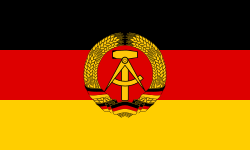 |
|---|
| This article is part of a series on the politics and government of East Germany |
|
Leaders of the Socialist Unity Party of Germany (SED)

| No. | Portrait | Name | Took office | Left office | Time in office | Party | |
|---|---|---|---|---|---|---|---|
| Joint Chairmen of the Socialist Unity Party Vorsitzende der Sozialistischen Einheitspartei Deutschlands | |||||||
| . | Wilhelm Pieck (1876–1960) | 22 April 1946 | 25 July 1950 | 4 years, 94 days | SED | ||
| . | Otto Grotewohl (1894–1964) | 22 April 1946 | 25 July 1950 | 4 years, 94 days | SED | ||
| General Secretary of the Central Committee (First Secretary of the Central Committee 1953–1976) Generalsekretär/Erster Sekretär des Zentralkommitees | |||||||
| 1 | Walter Ulbricht (1893–1973) | 25 July 1950 | 3 May 1971 | 20 years, 282 days | SED | ||
| 2 | Erich Honecker (1912–1994) | 3 May 1971 | 18 October 1989 | 18 years, 168 days | SED | ||
| 3 | Egon Krenz (born 1937) | 18 October 1989 | 6 December 1989 | 49 days | SED | ||
| (Honorary) Chairman of the Central Committee Vorsitzender des Zentralkommitees | |||||||
| 1 | Walter Ulbricht (1893–1973) | 3 May 1971 | 1 August 1973 † | 2 years, 90 days | SED | ||
On 1 December 1989, the People's Chamber removed the section of the East German Constitution granting the SED a monopoly of power—thus ending Communist rule in East Germany. Before the month was out, the SED transformed from a Leninist cadre party into a democratic socialist party, renaming itself first to Socialist Unity Party — Party of Democratic Socialism and later in the same year, to Party of Democratic Socialism (PDS). Hence, the party's subsequent leaders were no more leaders of East Germany than the leaders of other parties.
Heads of state
| No. | Portrait | Name | Took office | Left office | Time in office | Party | |
|---|---|---|---|---|---|---|---|
| President of the Republic Präsident der Republik | |||||||
| – | Johannes Dieckmann (1893–1969) Acting | 7 October 1949 | 11 October 1949 | 4 days | LDPD | ||
| 1 | Wilhelm Pieck (1876–1960) | 11 October 1949 | 7 September 1960 † | 10 years, 332 days | SED | ||
| – | Johannes Dieckmann (1893–1969) Acting | 7 September 1960 | 12 September 1960 | 5 days | LDPD | ||
| Chairman of the State Council Vorsitzender des Staatsrats | |||||||
| 1 | Walter Ulbricht (1893–1973) | 12 September 1960 | 1 August 1973 † | 12 years, 323 days | SED | ||
| – | Friedrich Ebert Jr. (1894–1979) Acting | 1 August 1973 | 3 October 1973 | 63 days | SED | ||
| 2 | Willi Stoph (1914–1999) | 3 October 1973 | 29 October 1976 | 3 years, 26 days | SED | ||
| 3 | Erich Honecker (1912–1994) | 29 October 1976 | 18 October 1989 | 12 years, 354 days | SED | ||
| 4 | Egon Krenz (born 1937) | 18 October 1989 | 6 December 1989 | 49 days | SED | ||
| 5 | Manfred Gerlach (1928–2011) | 6 December 1989 | 5 April 1990 | 120 days | LDPD | ||
| President of the People's Chamber Präsident der Volkskammer | |||||||
| 1 | Sabine Bergmann-Pohl (born 1946) | 5 April 1990 | 2 October 1990 | 180 days | CDU | ||
Heads of government
| No. | Portrait | Name | Took office | Left office | Time in office | Party | |
|---|---|---|---|---|---|---|---|
| Chairman of the Council of Ministers Vorsitzender des Ministerrats | |||||||
| 1 | Otto Grotewohl (1894–1964) | 12 October 1949 | 21 September 1964 † | 14 years, 345 days | SED | ||
| 2 | Willi Stoph (1914–1999) | 21 September 1964 | 3 October 1973 | 9 years, 12 days | SED | ||
| 3 | Horst Sindermann (1915–1990) | 3 October 1973 | 29 October 1976 | 3 years, 26 days | SED | ||
| (2) | Willi Stoph (1914–1999) | 29 October 1976 | 13 November 1989 | 13 years, 15 days | SED | ||
| 4 | Hans Modrow (born 1928) | 13 November 1989 | 12 April 1990 | 150 days | SED PDS | ||
| 5 | Lothar de Maizière (born 1940) | 12 April 1990 | 2 October 1990 | 173 days | CDU | ||
Heads of parliament
| No. | Portrait | Name | Took office | Left office | Time in office | Party | |
|---|---|---|---|---|---|---|---|
| President of the People's Chamber Präsident der Volkskammer | |||||||
| 1 | Johannes Dieckmann (1893–1969) | 7 October 1949 | 22 February 1969 † | 19 years, 138 days | LDPD | ||
| 2 | Gerald Götting (1923–2015) | 12 May 1969 | 29 October 1976 | 7 years, 170 days | CDU | ||
| 3 | Horst Sindermann (1915–1990) | 29 October 1976 | 13 November 1989 | 13 years, 15 days | SED | ||
| 4 | Günther Maleuda (1931–2012) | 13 November 1989 | 5 April 1990 | 143 days | DBD | ||
| 5 | Sabine Bergmann-Pohl (born 1946) | 5 April 1990 | 2 October 1990 | 180 days | CDU | ||
Heads of the military
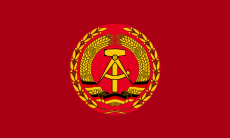
| No. | Portrait | Chairman of the National Defense Council Vorsitzender des Nationalen Verteidigungsrates | Took office | Left office | Time in office | Party | |
|---|---|---|---|---|---|---|---|
| 1 | Walter Ulbricht (1893–1973) | 10 February 1960 | 3 May 1971 | 11 years, 82 days | SED | ||
| 2 | Erich Honecker (1912–1994) | 3 May 1971 | 18 October 1989 | 18 years, 168 days | SED | ||
| 3 | Egon Krenz (born 1937) | 18 October 1989 | 6 December 1989 | 49 days | SED | ||
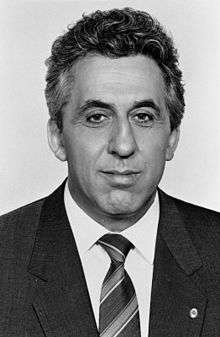
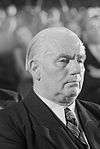
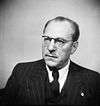
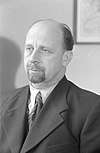

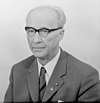
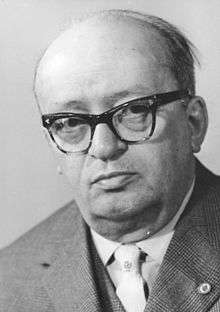
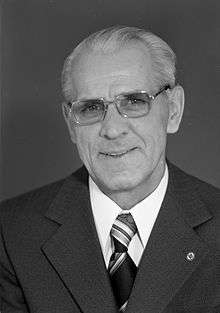
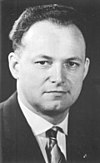
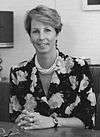
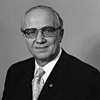
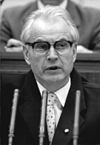
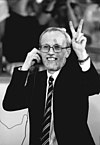

_(cropped).jpg)